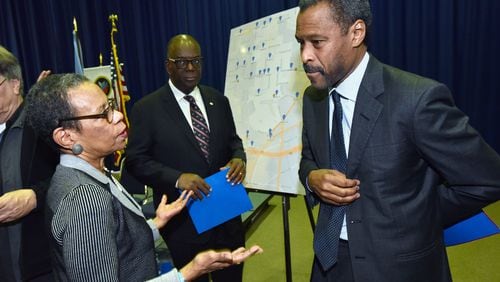Morehouse College president John S. Wilson was at an event last month alongside his three Atlanta University Center counterparts when he made a telling observation.
With four years of experience at his soon-to-end job, he had the longest tenure of the group. Other flagship historic black colleges and universities across the U.S. have also recently parted ways with presidents after short stints, raising concerns about continuity and stability.
It didn’t used to be that way. Presidents at HBCUs often stayed decades, carving out stable positions as important local or national leaders. Today, the average tenure is six years. Length of service is eight years for presidents at predominately white institutions, according to HBCU expert Marybeth Gasman, director of the Penn Center for Minority Serving Institutions. About one in six of the nation’s HBCUs don’t have a permanent president, she noted.
The shorter tenures and controversies surrounding some departures have raised fresh discussion about new difficulties of leading an HBCU — concerns that the problems will make it tougher to hire presidents, and worries about the deleterious effects on the schools whose key roles in the black community are shifting with economics and society.
Wilson’s departure came “at a very pivotal time in our history,” said Derrick Bryan, an associate Morehouse professor who is chair of Morehouse College’s faculty council.
There are few places held in greater esteem among African-Americans than HBCUs. It’s where many learn about black historical figures, literature and culture they never learned about in grade and high school. It’s where they make lifelong connections through fraternities and sororities. Many graduates followed their parents in attending the same HBCU.
Some HBCUs, with its lower tuition and a mission to lift up less academically-accomplished students, are often a ladder to better lives for poorer families. There are about 20,000 students in Georgia’s 10 HBCUs, both private and state colleges. The Atlanta region’s businesses, governments and culture are populated with graduates, from Atlanta Mayor Kasim Reed to Tony-winning director Kenny Leon.
The schools' roles are shifting as HBCUs face an array of issues and challenges which are making the jobs of presidents more difficult. Money is the most important factor. There's less of it at HBCUs and greater pressure for its presidents to raise more cash and manage finances, or lose their jobs.
The financial squeeze has multiple causes, from less state money to pinched students. Some students drop out because they can't afford the tuition, affecting enrollments. A recent United Negro College Fund study found HBCU students carry about twice as much debt as other students.
Endowments — money from friends and graduates — to pay for scholarships, professorships and new buildings is smaller on average at HBCUs than most other colleges. The endowment gap between them and other colleges is greater than 100 to 1, according to some accounts.
Then there’s questions about the commitment to HBCUs from the federal government, with the switch in the White House from President Barack Obama to President Donald Trump.
Another challenge for HBCU presidents comes from other, larger colleges where black students can get a good education, more scholarships, use cool technology and feel a kinship with other African-American students. Enrollment of black students at Georgia State University, for example, ballooned since 2005 from 28 percent to 40, state data shows.
Morehouse Student Government Association president Demarius Brinkley has seen classmates leave because of financial burdens. It worries him. Brinkley, raised in Madison, a small city of about 3,000 located 60 miles east of Atlanta, said he chose Morehouse because he felt an “emotional connection” when he visited the campus. He wants the same for future students and plans to mentor Morehouse students after he begins his career in real estate development.
Nationally, HBCU enrollment reached its peak the year after Obama became president in 2010, but has since declined by about 10 percent, according to federal data.
Wilson, who graduated from Morehouse in 1979 with future filmmaker Spike Lee and Jeh Johnson, who was U.S. Homeland Security Secretary for the last three years of Obama’s term, faces all those pressures.
Wilson is described as affable, but there was criticism he wasn’t as visible as some predecessors, such as Walter Massey, who was often seen walking around campus during his 12-year term.
“That’s the culture of HBCUs,” said Bryan. “(The president has) to be very outgoing and pastoral.”
One of Wilson’s predecessors, Benjamin Mays, was a pastor who led Morehouse for 27 years. Martin Luther King Jr., Morehouse’s most famous alum, called Mays his “spiritual mentor” and “intellectual father.”
Wilson acted quickly to resolve financial pressures, angering some alumni. He announced shortly after arriving that a crisis was forcing him to cut the college’s operating budget by $2.5 million, and he eliminated or downgraded 75 jobs. Enrollment started declining before he arrived, from 2,900 in 2007 to 2,200 by 2012 and remained about the same during Wilson’s tenure.
Some alums had never approved of his hiring. Before coming to Morehouse Wilson was executive director of the White House Initiative on HBCUs, which works to support the schools. Some believe decisions made during his tenure harmed HBCU funding, Gasman said.
Critics also complained that Morehouse’s credit rating dipped and that it saw a decline in independent school rankings.
Wilson tells a different story: one of graduation rates going up by four percentage points during his four years and alumni giving that’s doubled over the past year. He just obtained a $1 million grant to strengthen science, technology and math programs.
Morehouse’s board of trustees voted in January to not renew his contract when it expires in June, surprising many students, faculty and observers. The decision was made weeks before Morehouse celebrates its 150th anniversary with a month-long schedule of activities ranging from honors by city and state lawmakers to galas headlined by celebs such as Tyler Perry.
Through a spokeswoman, Morehouse board chairman Robert Davidson and the board declined comment about Wilson’s leaving, though they gave out a press release praising the man they had just effectively fired.
That type of silence about issues is something that has been typical of parting HBCU presidents in recent years, Gasman said. The vacancies include prominent schools such as Florida A & M and Fisk universities, whose presidents recently left with little public discussion.
Instability impacts enrollment negatively, some say.
The White House HBCU All-Star Students Program, a group of student leaders representing more than 70 HBCUs, wrote a letter to board trustees raising concerns about leadership stability at HBCUs in the wake of Morehouse’s decision and other campuses that have recently parted ways with their presidents.
“When you have changes in leadership, it undermines what the leadership is doing,” said Jarrell Jordan, a Morehouse sophomore who is involved in the program.
HBCU presidents and leaders are working hard to avoid similar fates and address the issues.
Herman Felton Jr., president of Ohio’s Wilberforce University, the nation’s oldest private HBCU, co-started a foundation about three years ago aimed at training aspiring HBCU presidents and administrators. He said some presidents weren’t a good fit with their board before they took the job, so the tenure wasn’t long. In many cases, the president and board had vastly different visions for the school.
Board “micro-managing” can be a problem at HBCUs, Gasman noted.
Felton cited managing the school’s finances, raising money and maintaining enrollment — as the greatest impediment to a president’s success. Felton, who’s been in the job for seven months, has been focused on raising money through multiple sources, such as grants. In December, Wilberforce received a grant from the UNCF for $1 million, the largest such grant in about a decade. Felton also said he’s been more aggressive in fundraising with alumni on social media. It’s a strategy being used about the majority, but not all, of HBCU presidents.
“I’m engaging (alumni) on Facebook,” said Felton, 45. “I’m engaging them on Twitter. I’m engaging them on Instagram.”
At Clark Atlanta University, which abuts Morehouse, the motto is "I'll find a way or make one." Its president, Ronald A. Johnson, recited the motto during an interview concerning the challenges of his job. Johnson, who became president in 2015, speaks with a level of frustration about some non HBCUs getting hundreds of millions of dollars to renovate their dining hall while his school gratefully accepts $5,000 checks. It can create pressure for any president.
Nearly 90 percent of its 3,700 students receive some financial aid. At Clark Atlanta, students graduate with an average of about $41,000 in debt, higher than any four-year college in Georgia, according to a recent survey.
Johnson has attempted to work with board members by meeting with them individually. He acknowledged some trustees can be impatient. It’s critical, Johnson said, for both sides to understand it takes time to implement a vision for a HBCU because of the financial challenges.
HBCU’s must do a better job marketing their accomplishments, particularly to potential donors, Johnson said.
Johnson said he feels “empowered” about its mission of preparing African-American students for the world. He was a first-generation college graduate, like many of his students.
“It’s not a vicarious interest,” he said. “It’s an interest from whence I came.”
But those pursuing their interest in leading an HBCU will continue to face questions and pressures. Gasman predicts presidential tenures will become shorter and that drafting good candidates will become more difficult. She hopes she’s wrong.
“This is the time we need to have the very best leaders in place,” she said.
Morehouse College has graduated countless prominent men who’ve made their mark in government, the arts, sports, business and theology. The most well-known graduate is the Rev. Dr. Martin Luther King Js.
Here’s a list of some famous Morehouse Men.
- U.S. Rep. Sanford Bishop, D-Ga.
- Nathaniel Bronner, founder of Bronner Bros. Beauty Cosmetics
- Radio talk show host and entrepreneur Herman Cain
- Maynard Jackson, Atlanta's first black mayor
- Actor Samuel L. Jackson
- Former U.S. Homeland Security Secretary Jeh Johnson
- Filmmaker Spike Lee
- Olympic gold medal track & field athlete Edwin Moses
- Former U.S. Surgeon General Dr. David Satcher
- Former U.S. Health & Human Services Secretary Louis Sullivan
About the Author







